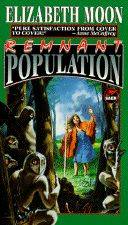

| Elizabeth Moon has her own Web page. | ||
| Click on a book's image or title to order from Amazon.com |

Remnant Population
Baen Books, © 1996, PB, 339 pp, ISBN #0-671-87770-4Reviewed July 1997
Remnant Population's big drawing point is its protagonist: Ofelia Falfurrias is an elderly woman (apparently in her mid-to-late seventies when the novel opens) who has lived most of her life on a corporate colony: A human colony on an alien world placed there to generate resources for the owning company. Ofelia has lived her whole life under the thumbs of others: First, her husband, and later, her children and grandchildren, each of whom thought they knew what was best for her, and who disregarded her judgments.
So, when the company decides to pull the colony out - having sold the rights to the world to someone else - Ofelia decides to stay behind. She hides out for a few days, and then finds herself all along on this world, with the computerized remnants of the colony at her command.
Remnant Population comprises three relatively distinct pieces. In the first third, Ofelia discovers the joys of her liberation from a society that never accepted her. She can wear what she wants (quickly doing away with shoes altogether), work on the projects she chooses (gardening, sewing), and reflect on her past life and those of the other colonists with some objectivity. Although she behaves rather oddly at times, by societal norms, it hardly matters, because she only has to satisfy her own norms. It's a nice depiction of the sort of near-total freedom that many people dream of from time to time. That it is perceived through the eyes of an elderly woman makes it even more interesting, as it's an unusual sort of protagonist for an SF story.
The second third of the book involves a surprise for her: The company which bought the planet sends a new colony, which lands elsewhere on the planet. While Ofelia listens covertly over an existing satellite, she hears the new colonists slaughtered to the last man by a hitherto-unknown indigenous population. Some of these indigenes recall when Ofelia's colony had landed years ago, and send a few of their own to investigate. A near-stone-age civilization, they befriend Ofelia and begin to learn about human technology. Ofelia, for her part, treats them like children and patiently (but not without some chafing over her lost solitude) works with them to understand each other.
An interesting element of the indigenes is that they appear capable of learning, reproducing, and improving on existing knowledge and technology at a rate far greater than humanity, which of course is cause for concern in the long run for their relations with the often-too-egotistical human race. This issue is outside the scope of the novel as a whole, so it is rightly not explored to its fullest extent, but I recall a Vernor Vinge short story (the name of which escapes me) which covered a similar race in more depth. I believe it appeared in his Threats and Other Promises collection, which at this time I don't own.
The final third of the book involves a human scientific team which arrives on the planet to investigate the indigenes. As expected, they largely ignore Ofelia, refuse to believe that she can communicate with the indigenes, and are later horrified that she's allowed them access to Earth technology. This third follows a rather predictable plot - Ofelia and the indigenes must preserve their freedom - and is substantially hampered by the agonizingly cardboard depictions of the science team. I would have been happier if this whole section had been removed from the book entirely and the earlier segments expanded upon.
Remnant Population has fairly simple goals, but those goals are intriguing and unusual ones, and it fulfills them fairly well. One might criticize that Ofelia is too-easily able to operate the colony by herself, but Moon does a fine job of rationalizing why this is possible (the colony's equipment was designed to be operated by nonprofessional settlers, and is therefore simple and modular in its design). Other than the final conflict, it's a fine novel which stands apart from its contemporaries.
hits since 13 August 2000.